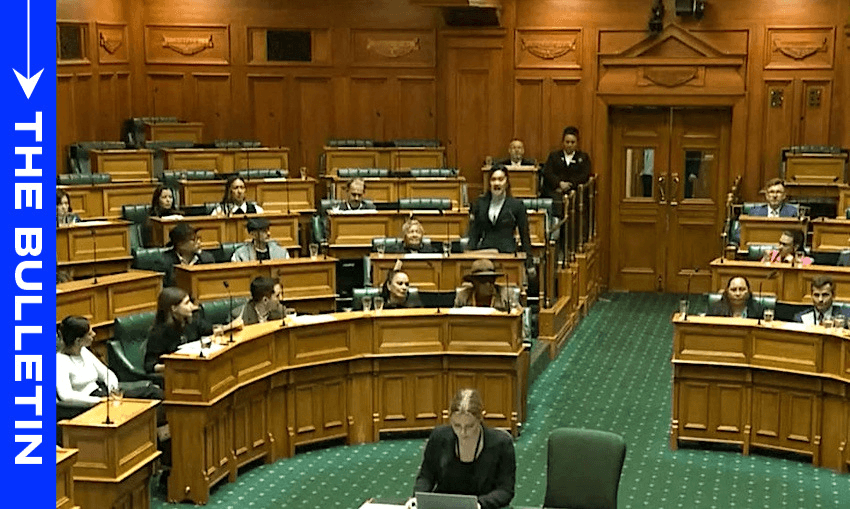With protests in the gallery, a projectile thrown and an MP ejected, the second reading of the controversial bill ended in a resounding defeat, writes Catherine McGregor in today’s extract from The Bulletin.
To receive The Bulletin in full each weekday, sign up here.
Disruption, then defeat
In a parliamentary sketch optimistically titled ‘The last day we’ll ever have to talk about the Treaty principles bill’, The Spinoff’s Lyric Waiwiri-Smith paints a vivid picture of a remarkable day in parliament. As widely predicted, the House – except for Act and its 11 votes – united against the bill, ending its journey in a two-hour debate that managed to be both fiery and strangely anticlimactic. Act leader David Seymour had barely begun his speech when a protester in the public gallery was removed for yelling in te reo Māori, prompting Speaker Gerry Brownlee to ask, “Where are the police?” and declare the outburst “completely unacceptable”. Earlier, an object believed to be a vape was thrown at Seymour, narrowly missing him.
The biggest commotion inside the chamber came from Labour’s Willie Jackson, who was ejected for refusing to apologise after calling Seymour “a liar”. In a defiant and emotional speech, Te Pāti Māori MP Hana-Rāwhiti Maipi-Clarke revisited the spirit of her headline-making haka from the first reading. “The real problem is that this institution, this House, has only ever recognised one partner, one culture, one language from one Treaty,” she said. Māori “had two choices, to live or to die,” she said. “We chose to live.”
Hipkins goes on the offensive
Following Seymour’s speech, the leader of the opposition rose to speak. In what Spinoff parliamentary reporter Joel MacManus said “might be the best speech of Chris Hipkins’ career”, the Labour leader talked about the importance of Te Tiriti o Waitangi and slammed National and NZ First for their role in allowing the bill to exist. “This is a grubby little bill, born of a grubby little deal,” he began. “This bill will forever be a stain on our country.” He praised the coalition of New Zealanders who had mobilised against it, and issued a scathing assessment of National’s conduct: “Not one National MP should walk out of this debating chamber today with their head held high, because, when it comes to this debate, they led nothing, they stopped nothing, and they stood for nothing.”
National’s Paul Goldsmith defended the government’s decision to allow the bill to a second reading, saying, “None of us got what we wanted, that is life under MMP. Our country is not so fragile that we can’t withstand a debate about the role of the Treaty.” He described Hipkins’ attack, and others like it, as “just froth and spray”.
The Luxon-shaped hole
As the opposition turned its fire on the government, one absence loomed large. Prime minister Christopher Luxon did not attend the debate, telling reporters earlier in the day that he had a pre-scheduled “series of engagements” in Auckland. Speaker Brownlee repeatedly shut down attempts by Jackson to point out Luxon’s absence, in line with parliamentary rules prohibiting references to non-attendance. But as NZ Herald’s Thomas Coughlan noted (paywalled), the lack of presence from nearly all of National’s front bench – with the exception of Paul Goldsmith and, briefly, Erica Stanford – made the point for him. “Nearly every Opposition MP showed up to the debate, but looked across the chamber only to find themselves facing a row of green leather.”
Trading treaty principles for trade policy
So where was the PM? While Parliament debated the country’s founding document, Luxon was in Auckland making calls to global leaders about Donald Trump’s flailing trade war. Earlier, he had given a speech at the Wellington Chamber of Commerce defending open markets, reports Coughlan (paywalled). Luxon used the example of Muldoon-era protectionism to illustrate why free trade is the much better path. The policies of that time “were a mistake that required years of difficult choices and careful recovery,” he said. “New Zealanders paid the price then. I don’t intend for them to do so again.” Whether voters will accept his free trade efforts as justification for missing one of the most consequential debates of the parliamentary term remains to be seen.
Read more:
